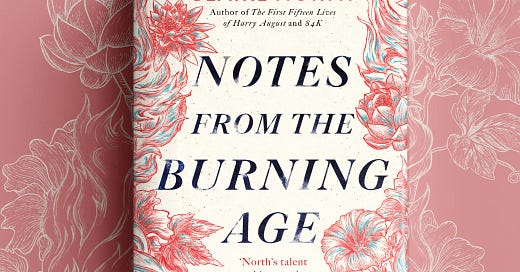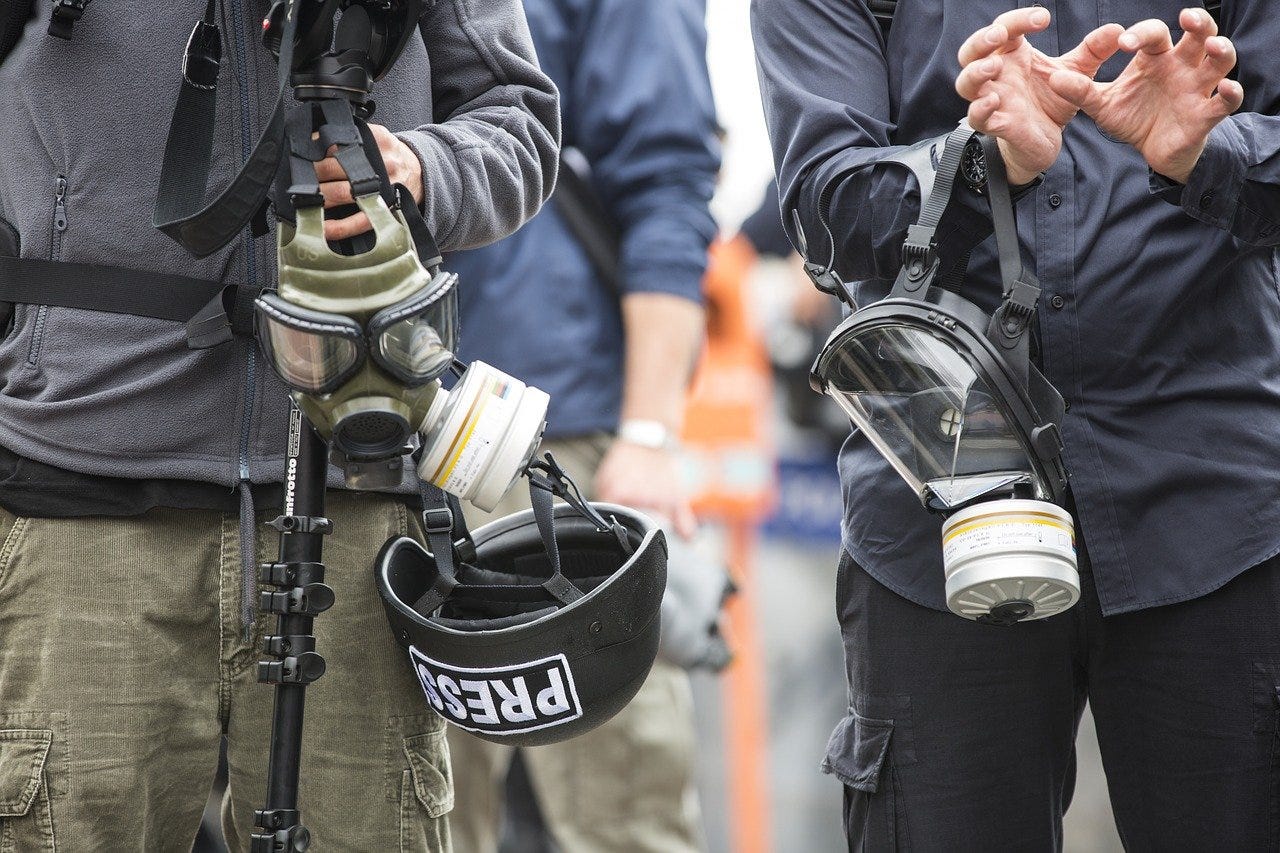6 April 2022. Climate fiction | Journalism
Spies from the post-carbon future. What journalists do.
Welcome to Just Two Things, which I try to publish daily, five days a week. Some links may also appear on my blog from time to time. Links to the main articles are in cross-heads as well as the story. Recent editions are archived and searchable on Wordpress.
1: Spies from the post-carbon future
The estimable people at Five Books send out a tweet every weekend asking what people are reading. The replies are a kind of current reading snapshot. And a couple of weeks ago, there was a lot of love for Claire North’s novel Notes From The Burning Age, published last summer, which in its way probably fits into the ‘climate-fi’ genre, broadly defined.
I’ve written about a couple of these recently, since both Kim Stanley Robinson and Neal Stephenson have recent books set in the near-term future that address climate change and our response to it.
Claire North is the name under which the novelist Catherine Webb writes science fiction. In contrast to the near future versions of Robinson and Stephenson, her book is set in a long-term future several hundred years away. But: the ‘burning age’ of the title is our age, but seen through the fragments of information from that age.
This piece is put together from a trio of the more interesting reviews. Gary Wolfe explains it this way:
(W)hat notes we get from that period come in the form of fragments from a distant past – religious documents written in a kind of faux-King James English, a few old books, and whatever data and archives the narrator, Ven Marzouki, was able to glean from ancient servers and hard drives in his previous position as linguist, translator, and priest.
Science fiction novels—of any kind—need to do some world building, and North portrays a world—set in present day Central Europe— that has survived the climate crisis, just about. Her description of ‘Vien’—it seems that this is a future Vienna—seems like a pleasant place to live, even if maybe a little closer to the present:
(T)he streets are clean, broad, and practical. Bicycle paths weave between the courtyard-shrouding hearths, old brick mixed with new mycelium and solar cell, creating a jigsaw of beige, white, crimson and grey. From the bathhouses and communal halls the morning smell of pine, yeast and tea… mingled with polite chatter and discrete silences between courteous people.
Of course, all science fiction is a commentary on the present, and this pleasantness is under threat from a clash of worldviews. The politics of this future world, as John Folk-Williams explains, involves
an uneasy alliance of broken countries now organized as Provinces under a Council that operates under the Temple faith. Its main tenet is to prevent the return of the old belief in human dominance and the technologies that supported it.
The Temple faith, in turn, is in the hands of the Medj priesthood,
who 'bowed to each tree in turn and made libations to the kakuy whose gift they were receiving'. This elusive concept of the kakuy is key to the civilization depicted here. Perhaps gods, perhaps demons, perhaps innate spirits of the forests, the mountains, the seas, the kakuy may be a pious myth, a real and ferocious force that rose in anger when humans defaced the earth, or a personification of the chaos and harm that came from that defacement. The Medj teaching is focussed on not rousing them again - if gods, they are gods who have no regard for Mankind, regarding us an irritant at best.
Some of this seems to be drawn from indigenous traditions, as well as some of our older cultural traditions (including pre-Christian traditions across Europe). Apparently some of our present religions have survived alongside it: there is a Jewish character, and the mosques and churches still stand in the future Istanbul.
What’s at stake is that this set of beliefs is challenged by ‘the Brotherhood’,
based in the old belief system that technologies to control the world must be revived and with them the values of personal gain, hierarchies of power and wealth and “freedom” to exploit the riches of nature. The Brotherhood is taking over one of the Provinces of the Council and threatens war to overthrow the Temple structure completely.
There are some spoilers in the three reviews I’ve quoted from here, but not many. Buried inside the conflict between these belief systems is a set of unescapable choices, as the reviewer known as ‘Blue Book Balloon’ observes:
Hovering over everything in Notes from the Burning Age are moral choices, the foremost of which is perhaps, how much damage must one accept to preserve peace? ... Notes from the Burning Age shows how these choices are inescapable, and perhaps, that there are no good options.
I’ve made it seem a bit theoretical here, but the plot is driven by that genre device of the spy who may not be a spy. All the reviewers agree that it’s wonderfully written. I have it on order.
2: What journalists do
I’ll be honest: I’m short of time tonight, with a heavy workload, and it was touch and go whether I’d get an edition out this morning. Tomorrow is looking pretty sketchy as well. But I was struck by this newsletter from the independent South African newspaper Daily Maverick, written by its editor Branko Brkic, who left Yugoslavia for South Africa just as the civil war broke out.
I started my career as a journalist, perhaps believing too strongly in what good journalism can do, but good journalism is a necessary part of any democracy—something we are reminded of when journalists are killed in war zones, but also when they are sued by oligarchs.
In this earthquakey world, the media should be the remaining spine, strong enough to hold values in place until the storm is over; the voice that can clearly and loudly say, this is good and this bad, and most people instinctively agree.
We should be an anchor in choppy seas, a safe haven in the storm.
And yet. And yet.
There follows a long list of what ‘Real Journalists’ do, “to help remind ourselves why we, the remaining media, are still here.”
(Image via Pixabay)
There doesn’t seem to be an easy way to link to a web version, so I am going to share the whole list here, rather than share extracts as I’d normally do:
Real Journalists run, face first. Towards fire. Towards trouble. Towards loud and dangerous thunder. Towards despots’ policemen and Nazi stormtroopers;
Real Journalists don’t “secure the perimeter” and tweet about their personal bravery;
Real Journalists photograph events they cover, not themselves doing it;
Real Journalists see and think ahead. When a shot is fired, they brace for the incoming barrage. When careless, cheap, xenophobic words are vomited by a populist politician in trouble, they prepare for incoming hordes baying for the blood of the weak and helpless;
Real Journalists are not scared of shouting politicians;
Real Journalists do not give up when a spokesperson or source ducks, dives and dodges;
Real Journalists join dots, read into trends, and see patterns and nuances behind dodgy business or government press releases;
Real Journalists are not stenographers. They know press conferences are only the beginning of the story;
Real Journalists always keep their distance when they cover people in power, money or fame – and never cosy up to them;
Real Journalists never see themselves as the story. They are never comfortable when put in the centre;
Real Journalists read. Long reports, research papers, legislation, forensic reports and court papers take much, much more time to understand, filter and analyse than a tweet;
Real Journalists have seen hundreds of careers destroyed on social media;
Real Journalists do not accept envelopes of any colour, free lunches, free holidays, clothes, gift baskets or favours;
Real Journalists do not write “stories” made up of connected tweets;
Real Journalists serve one master: Truth;
Real Journalists do not care about how many followers they have on Twitter;
Real Journalists do not care about being first, they care about being right;
Real Journalists never switch between journalism and anything else, especially PR;
Real Journalists are always about their community, society and democracy – always about what’s right, even if unpopular.
Real Journalists keep their compass, no matter what hell breaks loose around them.
j2t#295
If you are enjoying Just Two Things, please do send it on to a friend or colleague.




